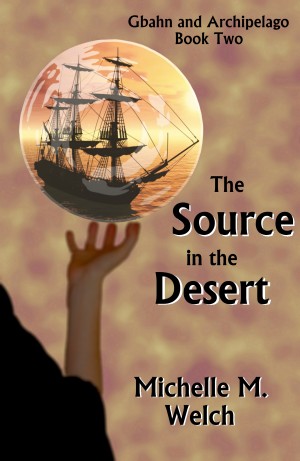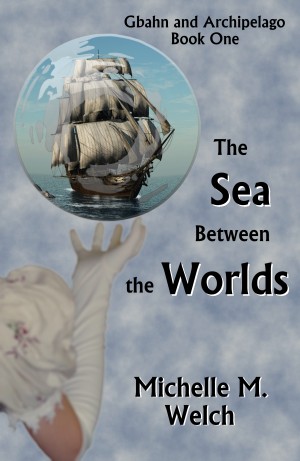Interview with Michelle M Welch
Published 2013-09-18.
What do you read for pleasure?
I read a little of everything: fantasy and science fiction, of course, but also some mystery, literary, historical, and mainstream fiction, and nonfiction in various subjects. As in my day job - as a reference librarian - I'm more of a generalist than a specialist. I may not be able to give you an in-depth discussion of every major fantasy novel published last year, but I can tell you a little about a lot of things. (I've started using Goodreads to track what I'm reading - look me up there to see more!)
What is your e-reading device of choice?
It's hard to answer this without putting my librarian hat back on, because e-readers and e-books are a topic of such debate in the library world. E-readers are just a tool. Use whichever one works for you, given the situation. I keep a book or two on my Android phone at all times, either in Kindle or Overdrive Media Console, so that I'm never stuck waiting in, for example, a doctor's office without anything to read. If I'm going on vacation, I'll pack my Kobo for long afternoons with a book. If I need to annotate anything, I'll use my old Sony touchscreen. And if I just saw something that caught my interest, it'll probably be in good old paper format.
Describe your desk
IKEA. Yes, I'm one of those people. My laptop is in the middle, an area I try to keep clear. Behind it is a shelf of reference material: dictionaries, a reverse dictionary (a very cool resource), a book of first names for inspiration, something called English Through the Ages (useful for historical work), and a thesaurus (which should be considered dangerous and used only in case of emergencies). The top shelf is lined with notebooks containing printouts of my books, since I like to have the hardcopy to flip through for quick reference. Some of the printouts are heavily copyedited and now unreadable. A few of the notebooks contain - seriously! - handwritten originals, since that's how I used to write until I sold "Confidence Game." The contract said I had a year to write a sequel, and that's when I decided to learn how to type.
Where did you grow up, and how did this influence your writing?
I was born and raised in Tucson, Arizona. It should not be surprising that deserts and hot weather make a frequent appearance in my books. However, cold weather and the sea also intrigue me, in part because they're so unfamiliar to me.
When did you first start writing?
I like to say that my kindergarten teacher put that fat pencil in my tiny little hand and I never put it down, although I might be misremembering my age. One clear memory I have is of the paper they gave us to practice our writing: it was blank on the top half and ruled on the bottom half, and we were encouraged to draw a picture in the top half and write a story about it. I always ran out of ruled paper and had to ask for more. I wrote copiously - but not necessarily *well* - until my junior year in high school, when my English teacher introduced us to stream of consciousness. That's when I started thinking about a character's internal development, as well as style and theme. Trying to get published seemed like a natural progression, but I didn't actually work on that until my 20s.
What's the story behind your latest book?
Not just one story, but a mashup of things. I got started reading Patrick O'Brian's sea stories at the same time as I was reading about the history of medicine. I was also reading about Muslim cultures. I also had a character lurking in my brain who felt everything very deeply, to the point that he was almost bipolar. I was also contemplating the theme of rape in fiction, especially in the "rape and revenge" stories that used to appear often in fantasy. I was also watching the TV show Becker. I suddenly had a vivid scene in my head where a cranky female physician was having an argument with a ship's surgeon at a Patrick O'Brian-style captain's dinner, defending her practice of serving women in a Muslim community. Soon the scene transported itself to a fantasy setting, the religions changed considerably, the bipolar character and the vengeful victim crept in, and a story emerged.
What motivated you to become an indie author?
My story is somewhat the reverse of those you see so often today, where an indie author is discovered by New York and gets a big book deal. I published three books with a New York publisher, but because the sales weren't strong enough for them, they never called back. I'm afraid this is a more common story in today's market, if not as well-publicized. However, as a fellow traditional-to-indie author says, we can now write what we want, when we want. That's a freedom that writers can really appreciate.
Smashwords Interviews are created by the profiled author or publisher.
Books by This Author
The Source in the Desert
by Michelle M Welch
The people of Gbahn face attack from the ships of the Archipelago. But the greatest danger may be from their own clerics and magic workers. Plagued by drought, dissent, and war, they have unknowingly released a force more powerful than they imagined. Their only hope might be a secret that has been hidden deep in the desert for centuries.
The Sea Between the Worlds
by Michelle M Welch
The island nations of the Archipelago build warships with scarce wood and forbid the use of magic as cheating. But when a threat comes from the south and the desert land of Gbahn, they must unite forces - and people from very different worlds will be brought together to face secret struggles as terrible as any battle.


